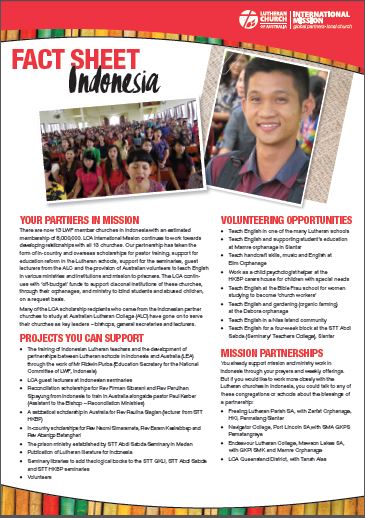KN-LWF Indonesia found that church members wanted more information about the Lutheran fellowship and Luther’s teachings as church reformers. KN-LWF Indonesia has several questions to reflect on. Is Luther’s reformation relevant today and is the Lutheran church in Indonesia still continuing its reformation and transforming itself? What does Luther’s reformation mean for churches in Indonesia and was Luther’s Reformation used to deepen and develop the faith and spirituality of church people living in a multicultural society?
The Lutheran Church in Indonesia has three main Theological Seminaries namely STT-HKBP (approximately 700 registered students), STT BNKP (400 registered students) and STT Abdi Sabda Medan (600 registered students). The theological seminary runs programs from undergraduate to doctoral level. In addition to the three main seminaries, the Seminary managed by GKLI named STT GKLI has 40 students, the HKBP Church as well as the Diacones School (125 students), Biblevrouw School or Bible Women’s School (90 students) and the Elder Teacher School (125 students). This is a strength for the Lutheran churches in Indonesia to further equip the educators of these theological high schools to deepen and make friends with Lutheran theology. Thus Lutheran theology can be part of the teaching curriculum in these theological high schools.Lutheranism is widely understood in its history of reforming the church. The main concern now is how to bring all, including church ministers and congregations, to interpret and actualize themselves as part of Lutheranism.
Based on some reflections on meetings with church leaders, they argue that Lutheran church members need to know and be proud of themselves as part of the Lutheran Church. The increasing development of new church doctrines in Indonesia since the last two decades shows a decline in church mainstreaming in Indonesia. The Lutheran churches in particular have lost their identity, while these newly expanded churches mix different church doctrines to suit the tastes of their congregations, not what the Bible requires. Church members today see how the churches and their liturgies please them without looking back at the history and doctrinal background of the churches again. Even more than that, the church has now become a business commodity for its owners.For this reason, the Indonesian Lutheran Study Center (LSC) is needed to maintain the identity of the Indonesian Lutheran church and to deepen Lutheran teachings and the meaning of the Lutheran Reformation to its members. LSC is intended as a forum for developing the spirit of witnessing to proclaim the good news. LSC is also meant to belong to all Lutheran member churches in Indonesia who are concerned about faith growth and action.
Aim:
Lutheran member churches have institutions to deepen and nurture theology called Lutheran theology, then are enabled to jointly respond to the problems that exist in the church and society today by improving their quality in understanding Lutheran theology and acting contextually.
Target:
- Attracting theological and academic researchers to conduct research and publish literature on Lutheranism in the Indonesian context;
- Illustrate contextual ideas that are useful for strengthening Lutheran identity in member churches and related institutions;
- Become a reference center for publications and other relevant sources






